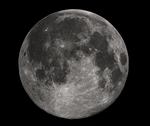Moon mining not pie in the sky
While we are decades away from developing the technologies needed to commercially exploit the moon’s resources, some experts are saying that we should already be thinking about lunar property rights.
When China’s lunar robot, Jade Rabbit, ground to an unexpected halt in January, it temporarily put paid to that country’s plan to drill moon rock with a view to establishing what minerals it contained.
According to Michael Brooks, writing in the New Scientist and re-published in the AFR, China is actively canvassing moon mining.
“They are looking at feasibility for mining the moon, and they are likely to do it if there’s a strong business case,” Brooks quoted Richard Holdaway, director of the space division at Britain’s Rutherford Appleton Laboratory, which closely collaborates with China’s space program.
Brooks says that there would be nothing illegal about China mining the moon, with international laws covering the moon in their infancy.
“In theory, anyone who could manage it (and afford it) could go to the moon tomorrow, dig out a huge chunk of lunar rock, bring it back to earth and sell it off to the highest bidder.
“The Chinese could take the moon apart and sell it bit by bit without breaking international law.”
The moon’s mineral endowment is not in question, with abundant quantities of rare earths, uranium and titanium. According to Brooks, “the main prize” is the lighter isotope of helium, known as helium-3.
“This gas is the critical fuel for nuclear fusion reactors, which promise an energy yield many times higher than the present generation of fission-powered reactors,” he said. “Helium-3 costs roughly US$10 million a kilogram. Though we don’t yet have commercial fusion reactors, these might not be far off.
“When they arrive, the demand for helium-3 will outstrip supply, and the easiest place to get more will be from moon rock. It couldn’t be easier: heat the rock and the gas comes out.”
Whether it’s for helium 3, minerals or plain water – essential to space travel – lunar resources will likely first find usage in supporting further space exploration.
“It makes much more sense to launch a manned mission to Mars from the moon than from earth: that way overcomes the difficulties of escaping our planet’s gravity,” said Brooks.
“Operators of fusion-powered Mars probes, crewed by astronauts from a lunar base, are the most likely customers of the first lunar industries.”
Space entrepreneurs are asking governments to nail down issues raised by who can mine the moon.
Robert Bigelow in the USA, who has contracts to supply astronaut habitats to NASA, told a press briefing that “The time has come to get serious about lunar property rights.”
Unfortunately, the two treaties covering the beyond-earth behaviour of nations and private companies – the Outer Space Treaty of 1967 and 1984 Moon Agreement – raise as many questions as they answer.
With moon mining operations still a long way off, different legal experts have different views on resolving issues around lunar property rights.
Joanne Gabrynowicz, a professor emerita of space law at the University of Mississippi, who acts as an official observer to a UN effort to oversee the legal framework governing use of space, believes that once a claim is laid, something will have to give.
“When it becomes apparent that there are going to be credible attempts at resource extraction, there will have to be some diplomatic discussions,” she said.
Another expert, Richard Bilder, a space law specialist at the University of Wisconsin-Madison said that with a high probability of such discussions hitting an impasse, it’s worth pushing nations to start setting up a legal regime straight away.
“This is likely to be easier to accomplish now, while prospects for lunar extraction are still only speculative, than after one or several countries succeed in establishing a lunar base and have clear special stakes and interests,” he said.
Source from here

